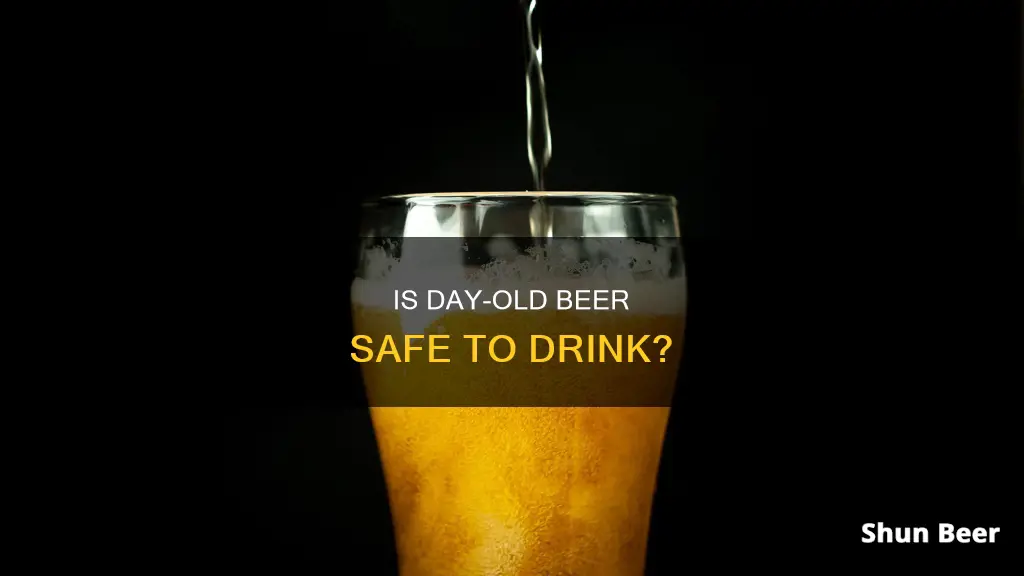
Drinking day-old beer is generally considered safe, but it may not taste as good as fresh beer. Beer is highly resistant to spoilage as it's pasteurized or filtered to eliminate bacteria, but its flavour can degrade over time due to oxidation, which is faster when the beer is left open and unrefrigerated. While drinking stale beer is unlikely to make you physically ill, it can leave you with a stomachache and ruin your sense of taste.
What You'll Learn

Is day-old beer safe to drink?
It depends on what you mean by "safe". Drinking day-old beer will not make you sick, but it might not taste very nice.
Beer is a perishable product that stales when exposed to light, oxygen, and heat, which degrade the organic compounds that make beer smell and taste great. However, even when its flavour is declining, it can be perfectly safe to drink.
The clock starts ticking on a beer's freshness as soon as you expose it to the elements. Generally, a sealed beer can stay at its optimal quality for about four to six months when stored at room temperature. However, if you open a beer bottle, it's only fresh for one to two days, so you should drink it within that period to enjoy its best flavour. Of course, you can still drink it after three days without exposing yourself to any health hazards, but its taste will be far from pleasant.
If you don't finish a beer, you can salvage it by chilling it from the start. Beer kept at a cool temperature has its oxidation process slowed, extending its shelf life. You can also use beverage canisters or other airtight containers to preserve open beer.
However, if you leave a beer open for more than a week, it's best avoided due to the risk of contamination by bacteria and other microbes.
Beer and Coronavirus: What's Safe to Drink?
You may want to see also

How does light exposure affect beer's shelf life?
Light exposure, especially from UV rays, can cause beer to develop a skunky odour and taste. This is more common in beers packaged in clear or green bottles, as brown bottles offer better protection, and cans completely block light from entering.
The skunky odour and taste are caused by the interaction of UV light with isomerized hop compounds, which produces 3-methylbut-2-ene-1-thiol (3-MBT). The presence of 3-MBT in beer is indicated by a distinct skunk character, also known as "lightstruck".
To prevent light exposure, brewers who package their beer in bottles typically prefer amber-coloured bottles as they block more UV light. Additionally, fermentation chambers or keeping the fermentor covered can help avoid producing off-flavours.
The degradation caused by light exposure cannot be reversed, and the beer will continue to lose flavour even if moved to a better storage location. Therefore, it is important to store beer in a cool, dark place, away from direct sunlight, to maintain its quality and prolong its shelf life.
RV Drinking Laws: Beer and Driving
You may want to see also

What does expired beer taste like?
Beer is a perishable product, and its flavour will degrade over time. However, it is safe to drink expired beer. The taste of expired beer depends on the type of beer and the way it has been stored.
Oxidation
When beer is exposed to oxygen, it can develop a stale "cardboard" flavour. This is because the oxygen changes the chemical composition of the beer, causing the aroma and flavour compounds found in hops to oxidise and dissipate over time. Beers with more alcohol by volume are slower to oxidise.
Temperature
Major temperature swings can also affect the speed of oxidation, with higher temperatures increasing the rate of the process. Beers stored at cooler temperatures will therefore stay fresh for longer.
Light Exposure
Light exposure can also cause beer to develop a "skunky" flavour. This is because the chemicals in hops react poorly with ultraviolet light. Bottled beers are often packaged in dark-coloured glass to prevent this.
Hoppiness
Hop aromas are very time-sensitive, so the citrusy, floral, or tropical hop aromas found in hop-forward beers will disintegrate over time.
Malt
Malty beers sometimes develop sweet, grainy, caramel, and toffee notes as they age.
Flatness
Expired beer often tastes "flat", as it loses its carbonation over time.
Beer Mug Package: Disney Cruise's Unlimited Alcohol Offer
You may want to see also

How long does beer last in the fridge?
Beer is best stored in a cool, dark place, away from temperature fluctuations. Beer stored in a refrigerator can last up to two or three years unopened, and unopened canned beer can last even longer. However, once a beer is opened, it will only last a day or two before oxidation destroys its flavours. Opened beer should be stored in an airtight container and consumed within a week.
Beer stored in a cool, dark place, such as a refrigerator, will remain at its best quality for up to eight months unopened. Unopened beer stored at room temperature will remain at its best quality for up to six months. Beer stored in a refrigerator will be safe to drink for much longer, but its flavour will begin to degrade after eight months.
The type of beer also affects its shelf life. Light beers, such as pale ales, wheat beers, lagers, and IPAs, should be consumed within three months of their packaging date. Heavier beers, like stouts and porters, have a longer shelf life of about six months. Barrel-aged beers, such as sour ales and imperial beers, can benefit from longer storage, as the souring agent in these beers continues to work for several years.
It is important to note that beer should not be frozen, as this will alter its taste. Additionally, bottled beer should be stored upright to minimise oxidation and avoid air leaks.
Beer and Thyroid Lobectomy: What You Need to Know
You may want to see also

How to store beer to maximise shelf life?
Beer is best stored in a cool, dark place, such as a fridge or cellar, and in an airtight container. The optimal temperature for storing beer is between 7°C and 16°C, with lighter beers stored at the cooler end and stronger beers at the higher end. Beer should be stored upright, to minimise the surface area exposed to oxygen, and kept away from direct sunlight, which can cause a chemical reaction that breaks down its flavour components, resulting in an unpleasant taste and smell.
To extend the shelf life of opened beer, seal it with an airtight cap or stopper to reduce oxidation and prevent carbonation loss. Opened beer should be consumed within a week, as it will start to lose flavour and quality after this time.
If you are storing multiple beers, it is a good idea to keep them in a cool, dry space, away from other foods, and to avoid moving them around too much. This is especially important for kegs, as too much movement can increase the amount of foam that spurts out when you tap the keg.
For home-brewed beer, glass bottles or kegs are the best storage options. Bottles are affordable and easy to store, but they need to be sanitised between brews, which is time-consuming. Kegs give you more control over carbonation but take much longer. During fermentation, store your home brew somewhere warm, then move it to a cooler place so it will be at the perfect temperature for drinking.
If you are creating a beer cellar, the ideal temperature is around 10 degrees below the beer's fermentation temperature. Store the beer in a dark place, away from direct sunlight, and try not to move it around too much, as this can cause chemical changes that will affect its flavour.
Beer and Breastfeeding: Is It Safe?
You may want to see also
Frequently asked questions
Yes, you can drink day-old beer, but it will likely be flat and have lost its initial flavour.
Yes, it is safe to drink day-old beer. Beer is extremely resistant to spoiling as it is pasteurised or filtered to eliminate bacteria.
To extend the shelf life of day-old beer, it is best to store it in the refrigerator or another airtight container.







